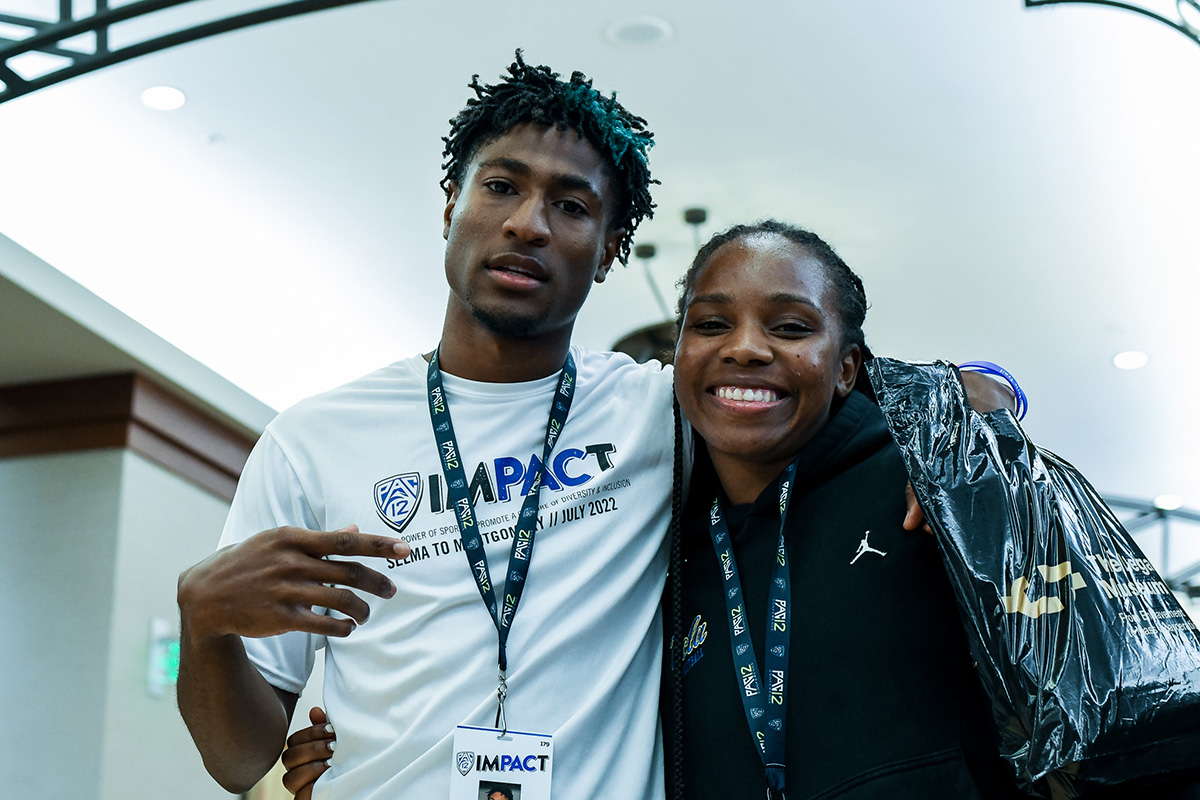Narrated Articles — PRIME: Not Just Athletes

Photo credit: Helen Quach
By Alicia Carhee
March 12, 2024 9:51 a.m.
Listen to Daily Bruin PRIME writer Alicia Carhee read her article about the harmful stereotype that all Black male Bruins play sports. The article was published in PRIME Winter 2024 on March 6, 2024.
Not Just Athletes
Dakotah Tyler started watching astronomy documentaries while rehabilitating a knee injury. He developed a fascination with the cosmos after realizing that his life – just like many planets and stars – was a mere speck in the infinite expanse of the universe.
Over 11 years later, Tyler dedicated his life to studying exoplanets in distant galaxies. And yet, as a Black Ph.D. candidate in astrophysics and a teaching assistant at UCLA, students consistently ask him one question: “Do you play a sport?”
While Tyler is not offended when he hears this recurring question, he often ponders the implications of this being students’ first thought.
“I’ve never had anybody walk up to me and ask me if I was an astronomer, which is what I actually am,” he said.
Tyler is not alone. Black men on campus frequently face stereotypes that suggest their presence within university spaces is solely tied to athletic ability. Many Black male students feel this misconception devalues their intelligence and discredits their hard work in getting accepted to UCLA. To dismantle this stereotype, Black male athletes and non-athletes alike are rewriting what it means to be a role model at UCLA.
Kenny Donaldson, a senior associate athletic director and director of equity, diversity and inclusion, said the myth is rooted in the hypervisibility of Black student-athletes.
“The average person turns on TV, and you see football. You see men’s basketball. … These are sports that have the majority of Black student-athletes,” Donaldson said. “So the narrative becomes that that’s all that they can do, that that’s basically their way to get into college.”
While the question “Do you play a sport?” might seem like a harmless assumption, its implications perpetuate harmful racial stereotypes. According to the Society for Personality and Social Psychology, the world’s leading organization of social psychologists, the inquiry not only reduces Black men to their physical traits, but also asserts negative assumptions about their intelligence. The same research stated that Black individuals have historically been stereotyped as naturally athletic, perpetuating the reductive notion that their success in sports is solely due to genetics.
Michael Pinckney, a second-year geography and environmental studies student who also competes in shot put, discus, hammer throw and weight throw events for UCLA track and field, has often been made aware of other students’ perceptions of his intelligence.
“They (My teammates) used to call it the blue bag syndrome,” he said. “If you wore the blue bag, the student-athlete bag, you automatically were assumed that you weren’t smart.”
Such assumptions have often led to classmates refusing to work with Pinckney on group projects, leaving him feeling excluded in the classroom. However, he believed his social isolation was not just caused by the “dumb jock” stereotype.
“I walk into classes and people look at me like I’m the outcast,” he said. “Now, that may just be (because) I’m a 6’5″, 300-pound Black male, and I’m intimidating, but also it feels to a point to where I don’t belong.”
The SPSP has found that the intersection of racism with typical jock stereotypes can cast uniquely negative stereotypes onto Black student-athletes.
Because of this pattern, Donaldson said it is important to change the UCLA community’s perspective on what Black student-athletes are capable of.
“I think that shifting the narrative to them being able to excel both academically and athletically at a school like UCLA is something to think about,” he said. “Push that narrative, as opposed to that’s (athletic success is) the only way they can get in school.”
Donaldson added that the media’s portrayal of sports as Black men’s only pathway to success limits the potential for all Black students – ultimately leading to a fixed perception of who Black men can be.
“There’s probably more Black people that are doctors and lawyers than are athletes,” Donaldson said. “There’s so much visibility behind athletes. … LeBron James is more well known than your Black doctor or a Black astrophysicist.”
As both a Black astrophysicist and a former collegiate athlete, Tyler is on a mission to erode the stereotypes impacting scholars such as Pinckney and himself.
Tyler attended the University of Kentucky as an undergraduate student with a football scholarship, where he played as a free safety in Division I football for four years.
But as a Black student at a predominantly white institution, Tyler said the student-athlete experience brought both positive and negative effects.
“It’s a double-edged sword, because it feels good to get that notoriety or that admiration from people,” he said. “But as you go on in life, you realize that it’s not necessarily the best thing to be validated just for something superficial.”
As an undergraduate, Tyler believed that the only way to reach success was through sports and planned to pursue a career in football coaching. It wasn’t until he suffered his knee injury that Tyler began to fall in love with astrophysics. Confronted with leaving his football days behind, he soon decided upon his next venture – attending Ivy Tech Community College to take prerequisites for studying astronomy.
However, many of his friends and mentors were confused about the sudden change.
When he told his past football coach about wanting to return to community college, Tyler sensed that his coach believed he lacked direction in life. But after earning a masters degree of science in astronomy and astrophysics from UCLA, his old coach told him how proud he was.
“I doubt that he even remembers that we had that conversation five, six years ago, but I do,” Tyler said. “It’s a good reminder that … nobody knows what you’re most passionate about. “
Daily encounters with the student-athlete stereotype also affect non-athlete students, leaving them to feel isolated on campus.
Christopher Jordan, a fourth-year film and television student and the public relations coordinator of the African Mxn’s Collective, said the stereotype undermines all students, athletes or not.
“It both devalues the Black students that come here for academic or artistic reasons,” Jordan said. “It also devalues the achievements of an actual student-athlete and the things they have to go through to get to this top level where they play for a school like UCLA.”
According to Jordan and fellow AMC members, many Black students experience imposter syndrome, a psychological condition of believing one’s success is not deserved or legitimately achieved despite being successful in objective, verifiable ways.
Justin Amakor, a fourth-year molecular, cell and developmental biology student and co-chairperson of the AMC, said his feelings of imposter syndrome led him to question if he is supposed to be in a college environment.
Pinckney and Donaldson said Black student-athletes face similar feelings of imposter syndrome. Donaldson attributed this phenomenon to the pressures of feeling like they must excel academically and athletically, all while experiencing judgements that discredit their belonging on campus.
Tyler noted that imposter syndrome can also go hand-in-hand with stereotype threat – a phenomenon he said occurs in environments where frequent negative stereotypes or low expectations are aimed at a certain group of people.
“That kind of added mental stress can cause you to struggle in those scenarios where you feel like you’re being watched or judged and cause you to trip up,” he said.
According to research published by the Harvard Education Review, Black students fear confirmation of negative misperceptions and work to resist these stereotypes through leadership roles, academic prowess and holding themselves to high standards. In addition, Sociology of Sport Journal states that Black athletes serve their community as role models given their hypervisibility in the media.
Chase Griffin, a graduate student in legal studies at the UCLA School of Law and quarterback for UCLA football, said he has been able to annul negative stereotypes through his family’s support and giving back to the Los Angeles community.
“I was blessed to be raised in a family where me being Black didn’t really make me feel like I was expected to do less,” he said. “I was expected to do more.”
According to the Journal Committed to Social Change on Race and Ethnicity, studies found that there is a prominent adoption of individual social responsibility – the theory that individuals must fulfill a civic duty to benefit the whole of society – among Black male athletes in both professional and college sports. The research noted that Black male college athletes often display individual social responsibility through role modeling because of their idol status in sports media. Sharing this understanding, Griffin recognized the importance of athletes using their platforms to push the culture forward.
“It’s important to understand that what you do will impact the communities around you,” he said. “It’s been extremely rewarding for me as far as my ability to help the LA community and help galvanize other boroughs to do the same.”
In August 2023, Griffin launched The Chase Griffin Foundation, which supports initiatives to relieve food insecurity. Within six months, the foundation raised $11,530 from outside donations and made 19 grants to four charities. He also personally donated around $35,000 of his own money.
“I wanted it to help the youth, just because food insecurity was something that a lot of my friends in high school struggle with back home in Texas,” he said.
Inspired by his own role models of Black student-athletes such as Ralph Bunche, Jackie Joyner-Kersee and Jackie Robinson, Griffin emphasized the importance of advocating for the Black community at UCLA. Griffin attributed much of UCLA’s prestige to the influence of Black student-athletes in history and said he strives to honor and represent his Black peers against negative stereotypes, just like the Black athletes who came before him.
Pinckney takes a similar approach. For example, in 2022 Pinckney served as a mentor for a summer bridge program in New York City, where he advised Black student-athletes on how to navigate their transition into high school. He said his achievements inspired his students, proving that Black people could succeed in school and in predominantly white sports such as throwing and track and field.
“During my high school career, I came out and I proved that in a sport that is predominantly white, Black people can excel and do a damn good job as well,” he said.
Because of Black college athletes’ large presence in the media, Donaldson added that many young Black students look to Black athletes as a source of representation.
“They look and say, ‘Hey, if that student that looks like me is able to get to that level, that’s something that I can strive to achieve to be,’” he said. “I think it’s the same, as a young Black person, if you see a Black doctor on TV or a Black lawyer – representation matters.”
Growing up, Tyler said that he doesn’t remember looking up to any Black scientists, but rather athletes and musicians. Although he acknowledges that aspiring to these careers is perfectly fine, Tyler emphasized that the lack of role models for Black individuals can contribute to limiting them to specific endeavors based on their race.
Tyler hopes he can inspire young people to be even better scientists. He said that representation is all it takes for young Black people to see that these careers are viable options for them – that it’s something they can do too.
The AMC also highlighted the importance of role modeling in reducing the consequences of the student-athlete stereotype, especially imposter syndrome.
As AMC members, Amakor and Jordan strive to be guiding mentors for current and prospective male undergraduates. Fred Donfack, a second-year business economics student, shared similar feelings.
“I just let them know that it’s a realistic goal if you really want to come here,” Donfack said. “Be the number that makes us a bigger number.”
With this goal in mind, the AMC hosts events to bond the Black male community at UCLA, such as beach bonfires, basketball games and study halls to help with the university’s retention of Black men. Even with these efforts, AMC members and athletes, such as Pinckney, said there is still a persistent feeling of isolation among Black male students at UCLA, both non-athlete and athlete.
According to UCLA 2023 fall enrollment data, out of 33,040 total undergraduate students, only 666 undergraduate students identified as African American males. In other words, the percentage of African American male undergraduate students accounts for only 0.2% of all undergraduate students.
Jordan emphasized the need to fund more programs such as the Black Bruin Resource Center to invest in welcoming spaces for Black male students.
“Having spaces to ourselves to be ourselves in an authentic way, I think is really part of the key to survival, mentally, at this school,” he said.
Donaldson added that UCLA Athletics is working to further support Black student-athletes holistically in social, physical and academic spaces.
“Our head coaches for our Black student-athletes … do a good job of surrounding them with resources with both people, being mentors, but also the alumni network, campus resources and things like that,” he said.
Donaldson personally makes sure to connect Black student-athletes with other Black students, Black faculty, mental health providers and mentors to ensure that they are socially integrated and supported at UCLA. He added that athletes attend workshops to discuss equity, race and gender.
Tyler is also trying to break the cycle of harmful stereotypes surrounding Black men. From watching astronomy documentaries to becoming a Ph.D. candidate in astrophysics, Tyler now documents his science journey on social media. He uses platforms such as TikTok and Instagram to show others that science is not confined to one demographic. In an Instagram video titled, “When They Try to Stereotype You, Just Remember This One Thing,”Tyler responded to commenters who still doubt and demean his validity as an astrophysicist.
“Did Andromeda stop being a galaxy because the humans didn’t think that it was one?” he asked.
Under this video, compliments and praise flood the comment section. From responses such as, “love me a scholar with a grill” to, “you help me … to (not) give up on my dreams of becoming an astrophysicist,” it is evident that viewers appreciate Tyler’s authenticity.
“Unintentionally, you break the stereotype by being yourself because you’re being authentic to you and what you’re interested in,” he said. “We all have stereotypes, and trying to fit into that box is worse than trying to make your own box.”






